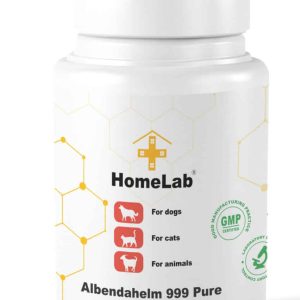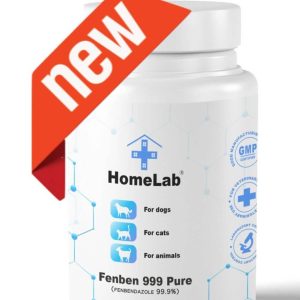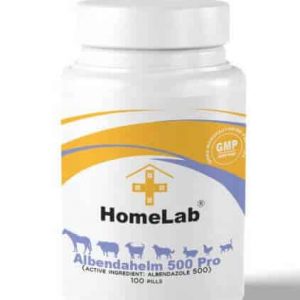Dogs make wonderful companions and additions to any household. With that being said, as a dog’s parent, you need to be aware of the various health challenges faced by dogs. Dogs are active in nature and as such, they “sniff” around rather frequently. As a result, they are exposed to parasitic worms. They also touch unknown things regularly and afterwards lick their paws. Often-times, these activities and interactions can be a potential source of worm infections. It is easy for dogs, especially puppies, to catch a worm infection. If you notice a change in your dog’s behaviour or bathroom patterns, this could be an indication that your dog is infected by worms. It may take up to a couple of weeks for symptoms to be apparent.
Here are our top picks for deworming products.
-
Product on sale
 Pure Albendazole Powder 100gOriginal price was: $105.00.$97.00Current price is: $97.00.
Pure Albendazole Powder 100gOriginal price was: $105.00.$97.00Current price is: $97.00. -
Product on sale
 Fenbendazole Powder 100 percent Pure Dewormer for Dogs 100 gramsOriginal price was: $120.00.$108.00Current price is: $108.00.
Fenbendazole Powder 100 percent Pure Dewormer for Dogs 100 gramsOriginal price was: $120.00.$108.00Current price is: $108.00. -
Product on sale
 Albendazole Tablets Dewormer for Dogs 100 count (Albendahelm 500 Pro)Original price was: $65.00.$55.00Current price is: $55.00.
Albendazole Tablets Dewormer for Dogs 100 count (Albendahelm 500 Pro)Original price was: $65.00.$55.00Current price is: $55.00.
Some common symptoms of worm infection include: a change in appetite or a complete loss of appetite, vomiting, diarrhoea and loss of weight. Gastrointestinal parasites can also cause serious complications in dogs such as life-threatening anaemia, protein loss from the body, and intestinal obstruction.
There are various types of worms responsible for these infections, four of which are most common: roundworms, tapeworms, hookworms and whipworms. The presence of these worms can be confirmed by a stool test. The heartworm is particularly dangerous as they can cause fatal infection in dogs; its presence can be confirmed by a blood test.
Let’s have a look at the types of parasitic worms and how they cause infection in dogs.
Common Types of Worms Infecting Dogs
Roundworms

Roundworms, as the name suggest, are oval-shaped worms. They may enter a dog’s body when it sniffs or licks sources containing roundworm’s larval eggs. When roundworms infect a dog, their larvae first attack the dog’s intestine and absorb nutrients from the body of the dog. From the intestine, they can further move onto other tissues and organs. Different types roundworms infect different regions of the body. For example, toxocara canis larvae will move from intestine to lungs when they mature.
Tapeworms

Tapeworms are worms that live in the small intestine of dogs and they absorb all nutrients from the food ingested by the infected dog. Tapeworms tend to stay for long periods within a dog’s system and its symptoms may remain unclear for some weeks or even months.
Hookworms

Hookworms are short and they suck blood from their infected host. They enter a dog’s body when it comes in contact with hookworm eggs. Hookworms can be deadly, especially among young puppies. They move around the body and re-enter the intestine.
Whipworms

Whipworms can enter a dog’s body through contaminated soil. These worms reside in the large intestine of infected dogs. Whipworms extract less nutrients when compared to the other worms. The infection caused by whipworms can reach extreme levels, but only when the worms move into the intestinal tissue.
Heartworms

Heartworms reside in the heart, lungs, and blood vessels of their host. These worms can cause severe health problems among dogs and sometimes lead to death. The common mode of transmission for heartworms is via an infected mosquito bite, transferring it from one dog to another.
Importance of Deworming

Infections from worms can cause serious health complications to your dog, some of which can be fatal. These infections can be minimized and prevented by implementing measures such as cleaning up after your dog goes to the bathroom, checking your dog’s health periodically, giving your dog regular baths, and using injections as advised by vets. However, no matter how careful you are, it is sometimes impossible to prevent a worm infection. In most cases, deworming is the only solution.
The process of removing these fatal worm parasites from your dog’s body is known as deworming. There are several ways to deworm your dog. It is advisable to practise deworming at an early stage to mitigate against serious health complications. Deworming needs to be carried out periodically, starting from a few weeks to months. It is best to first confirm the type of worm infection with a veterinarian before administering any deworming methods. When your dog is undergoing deworming, it is important to prioritize good hygiene as the worms will be released through faecal matter or other forms.
Deworming medications are generally safe to use, however, your dog may experience loss in energy or lack of appetite as a result.
Let’s have a look at some medications that serve useful for deworming dogs.
Medications for Deworming Dogs
Deworming in the event of heartworms can be an expensive process. Your dog will have to go through a series of tests, starting with a blood test. Antibiotics and anti-inflammatory medications are suggested for dogs suffering from a heartworm infection. You can also take them to the veterinarian for shots as a part of the treatment.
In other cases, the veterinarian may recommend dewormer medications such as Pyrantel. You can also use other over-the-counter medications such as Bayer Tapeworm Dewormer tablets, Panacur C Canine Dewormer and Drontal Plus. If your dog is pregnant, then vets may advise you to administer deworming after the puppies are born.
Deworming medications come in three main forms: syrups, tablets, and XL tablets.
Syrups: Oral liquids that can be given to dogs come in different quantities. They are easy to administer and can also be fed to puppies. Venkey’s Puppy Dewormer is a broad spectrum dewormer for puppies. Cipla Mexam oral suspension and Savavet kiwof dewormer for puppy are examples of some commonly used syrups.
Tablets: Tablets are difficult to feed to your dogs. You may opt to crush and mix the tablets in food and then give to your dog to eat. There are many tablet options available such as Zoetis Alfanil, Savavet Kiwof Dewormer for dogs, Petcare Plazipus Dewormer for dogs, Beaphar Worex tablets for dogs, and Bayer Drontal Plus Dewormer.
XL tablets: When more than two tablets need to be given to your dog in one dose, you can choose XL tablets instead. XL tablets are ideal for adult dogs. Beaphar Worex XL tablets for dogs, Savavet Kiwof Plus XL tablets, and Sawavet Kiwof Plus are good brands in this category.
Top Deworming Products
You will find an abundance of over-the-counter or online options for deworming your dog. Here are some key brands that you might want to look out for.
Excel Dog Roundworm Dewormer
This dewormer comes in the form of syrup. It is composed of piperazine as the main ingredient which makes it a quick reactor and an effective treatment against roundworm infection. It also has a pleasant taste and your dog will not realise its presence when mixed in food.
PetArmour Sure Shot 2x Liquid Wormer
As the name suggests, this is another oral liquid for puppies and dogs of all ages. It is highly effective against different species of hookworms and roundworms because it contains pyrantel pamoate as the active ingredient.
Bayer Tapeworm Dewormer
In case your dog is infected with tapeworms, then this product would be an ideal choice. The active ingredient is praziquantel and this dewormer comes in tablet form. It is safe for use in dogs of any age group. Moreover, it poses a low-risk of side-effects.
Savavet Kiwof Dewormer Tablet
Savavet is a leading brand, and this product is effective for killing all types of worms. It can be fed to dogs of any age. These tables can be chewed easily or mixed with food.
Merck Panacur C Dewormer
It comes in a powdered form and contains fenbendazole as the active ingredient. It can be used to fight against roundworms, hookworms, tapeworms and whipworms.
Bayer Quad Dewormer for Dogs
This can be used against any parasitic worm even when you are unsure of the parasitic worm. Praziquantel, pyrantel pamoate, and febantel make it a broad spectrum dewormer which acts quickly. It comes as a tablet and can be added to your dog’s food in crushed form.
Safe-Guard 8-in-1 Dewormer for Dogs
This is another broad spectrum dewormer that is effective against roundworms, hookworms, tapeworms and whipworms. Its powder form makes it easy to administer and it causes little to no side effects.
Fur Goodness Sake Deworm Gold
If you prefer administering a dewormer composed of natural ingredients, then this is a good option. It is effective against all parasitic worms and is a natural preventive as well. Additionally, it results in no side effects because the ingredients are herbal.
Deworming Frequency and Dosage
It is best to approach a Veterinarian for information pertaining to the correct dosages for each medication. Vets will provide details of the recommended dose and specify if the course of action needs to be repeated after certain periods. For puppies, it is recommended to deworm when they are at least 3 weeks old. The deworming process is typically carried out at 2 week intervals until they are 12 weeks old. The deworming routine normally changes as the puppy grows. The frequency of deworming decreases as your dog grows into an adult. Deworming can be performed by using different medications each time to increase effectiveness.
Potential Side-Effects of Deworming Your Dog
You have given your dog the prescribed medications, but you still need to pay attention!
It is best to administer deworming at nights before your dog goes to bed. Deworming medicines will provide relief to your dog from discomfort, however, in odd cases, there may be some side-effects. This can be in the form of behavioural shifts or symptoms such as diarrhoea, vomiting, and fatigue. Such side-effects are temporary and will be less frequent and disappear after 1-2 days. In addition, some dewormers can cause side-effects in puppies, which may include breathing problems and excessive drooling. In such cases, it is advisable to let a vet examine your puppy. You may also want to keep an eye out for extreme cases, where your dog undergoes prolonged suffering or stomach pain after deworming. Vets may suggest getting an operation for such extreme conditions.
Foods to Aid the Deworming Process
Whilst deworming your dog with medication, you may also consider adding certain foods to your dog’s diet. This would promote a speedy recovery process and build your dog’s immune system.
Fermented Vegetables
Fermented vegetables are a safe method for enhancing the deworming process. Fermented vegetables such as sauerkraut and carrot work well. These help to elevate your dog’s immune system and get rid of harmful worms. You may consider store-bought options or make them at home.
Papaya
Papaya contains an enzyme known as papain which fights against parasitic worms.
Pomegranate
If your dog is infected with tapeworms, then consider pomegranate as a therapeutic addition in its diet. Pomegranate is known to be effective against tapeworms. You can give your dog pomegranate juice, which is easy to administer.
Pumpkin Seeds
Pumpkin seeds can be crushed and added to your dog’s meals. They are also a safe way of treating worms.
Dried Coconut
Coconut helps to remove worms from the body naturally. You can add grated coconut into your dog’s meal. The proportion would vary depending on the age of your dog, starting with 1 tsp for a puppies, 2 tsp for middle-aged dogs, and so on.
Turmeric
Turmeric can aid in strengthening your dog’s immune system and overall gut health. It also has anti-inflammatory properties.
Conclusion
Parasitic worms can make your cheerful and active dog fatigued and sick. Your dog may be silently suffering without your knowledge. Dogs are susceptible to parasitic worms and deworming is essential to fight against these worms and there is absolutely no need to be scared. If you check with your vet and follow the prescription, your dog should recover in no time! Along with medications, include foods that help to build the immune system and overall gut health is strongly advisable.
Many deworming medications are available online. If you are unable to visit or afford a veterinarian appointment, you can opt for one of the broad spectrums of dewormers mentioned. Be mindful to use dewormers suitable to the age group of your dog. Dewormers commonly come in powder, liquid or tablet form. Powder and liquid dewormers are easier to administer than tablets. Some tablets may be chewable whilst others need to be crushed and added to your dog’s meal. Keep in mind that your dog may also undergo some side-effects, so watch out for those too. If the side-effects are complex, contact a vet immediately. Alternatively, you can seek herbal options that have no side-effects.
Hope you found this article insightful and informative!
 Total Pooch Dog Supplements, Tear Stain Removers, De-wormers, Tylosin for Dogs and other great products.
Total Pooch Dog Supplements, Tear Stain Removers, De-wormers, Tylosin for Dogs and other great products.





